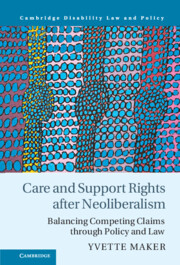Book contents
- Care and Support Rights after Neoliberalism
- Cambridge Disability Law and Policy Series
- Care and Support Rights after Neoliberalism
- Copyright page
- Contents
- Table
- Foreword
- Acknowledgments
- Abbreviations
- Introduction
- Part I Care Policy Tensions
- Part II Balancing Competing Claims through Rights-Based Policy and Law
- Part III Care and Support Policy Tensions in Two Liberal Welfare States
- 6 Income Support for Carers of Children with Disabilities in Australia
- 7 Care, Disability and Gender Equality in Australian Carers’ Income Support
- 8 Incorporating Multiple Options and Perspectives
- 9 Care and Support for Adults in England
- 10 Care, Disability and Gender Equality in English Care and Support Policy
- 11 Maximizing Options and Opportunities
- Conclusion
- Index
- Other Books in the Series
10 - Care, Disability and Gender Equality in English Care and Support Policy
Well-Being for All with Resources for a Few?
from Part III - Care and Support Policy Tensions in Two Liberal Welfare States
Published online by Cambridge University Press: 21 April 2022
- Care and Support Rights after Neoliberalism
- Cambridge Disability Law and Policy Series
- Care and Support Rights after Neoliberalism
- Copyright page
- Contents
- Table
- Foreword
- Acknowledgments
- Abbreviations
- Introduction
- Part I Care Policy Tensions
- Part II Balancing Competing Claims through Rights-Based Policy and Law
- Part III Care and Support Policy Tensions in Two Liberal Welfare States
- 6 Income Support for Carers of Children with Disabilities in Australia
- 7 Care, Disability and Gender Equality in Australian Carers’ Income Support
- 8 Incorporating Multiple Options and Perspectives
- 9 Care and Support for Adults in England
- 10 Care, Disability and Gender Equality in English Care and Support Policy
- 11 Maximizing Options and Opportunities
- Conclusion
- Index
- Other Books in the Series
Summary
This chapter examines how the English Care Act deals with care, support, paid work and disability, particularly how it addresses the tension between supporting women’s unpaid care and their paid work participation and the tension between supporting carers’ claims and supporting disability rights claims. In light of its apparent support for multiple activities and multiple constituencies, a purpose of this second case study analysis was to explore opportunities to build on elements of the policy that align, or at least partly align, with the rights-based approach proposed in this book. The analysis in this chapter indicates that the policy has positive features but is far from a panacea. It applies only to adults, and only a small subset of care and support users and carers with the greatest level of need can access financial support. While the reforms purported to enhance individuals’ self-determination and choice in a manner consistent with disability rights claims, they were also consistent with neoliberal goals of shifting responsibility from the state onto individuals and the market. In the wider context of austerity-related reductions in local authorities’ resources, the policy can make only a modest contribution to the realization of care and support rights.
- Type
- Chapter
- Information
- Care and Support Rights After NeoliberalismBalancing Competing Claims Through Policy and Law, pp. 215 - 245Publisher: Cambridge University PressPrint publication year: 2022

